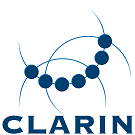Conceptual resources: Difference between revisions
Marked this version for translation |
No edit summary |
||
| Line 74: | Line 74: | ||
== Datasets for Psychological Research == | == Datasets for Psychological Research == | ||
https://www.ugent.be/pp/experimentele-psychologie/en/research/documents | https://www.ugent.be/pp/experimentele-psychologie/en/research/documents | ||
== Dutch FrameNet == | |||
Framing situations in the Dutch Language. | |||
*[http://dutchframenet.nl/ Project Website] | |||
</translate> | </translate> | ||
Revision as of 13:26, 2 December 2024
Open Dutch Wordnet
Open Dutch WordNet is a Dutch lexical semantic database. It was created by removing the proprietary content from Cornetto, and by using open source resources to replace this proprietary content.
Cornetto-LMF (Lexicon Markup Framework)
Cornetto is a lexical resource for the Dutch language which combines two resources with different semantic structures. It includes the Dutch Wordnet which organizes words in sets of synonyms (synsets) and records semantic relations between them. It also includes the Dutch Reference Lexicon which organizes words in form-meaning units (lexical entries) and describes them with short definitions, usage constraints, selection restrictions, syntactic behaviours, combinatorial information and illustrative contexts. Cornetto can be considered as the combination of a thesaurus and a dictionary. It is accessible for human use via a web browser and it is also available in XML for computational use (opensourcewordnet). Cornetto has circa 177,000 lexical entries and 70,000 synsets.
Dutch SemCor
Dutch SemCor provides a corpus, fully sense-tagged with senses and domain tags from the Cornetto database
EuroWordNet Dutch
EuroWordNet is a multilingual database with wordnets for several European languages (Dutch, Italian, Spanish, German, French, Czech and Estonian). The wordnets are structured in the same way as the American wordnet for English ( Princeton WordNet, Miller et al 1990) in terms of synsets (sets of synonymous words) with basic semantic relations between them. Each wordnet represents a unique language-internal system of lexicalizations.
Open Multilingual WordNet
The goal of this project is to make it easy to use wordnets in multiple languages. There are currently two versions of the OMW.
- OMW Version 1 links hand created wordnets and automatically created wordnets for over a 150 languages through the Princeton Wordnet of English.
- OMW Version 2, the current (experimental) version, uses the Collaborative Interlingual Index to link the wordnets together
Word Association Data
Word association and participant data for 100 primary, secondary and tertiary responses to 12,571 cues as reported in De Deyne, Navarro and Storms (2013).
- Data download
- De Deyne, S., Navarro, D., Storms, G. (2013). Better explanations of lexical and semantic cognition using networks derived from continued rather than single word associations. Behavior Research Methods, 45 (2), 480-498.
Age of Acquisition Data
Following similar studies in English, ratings of age of acquisition for 30,000 Dutch words are presented and validated. These include nearly all lemmas language researchers are likely to be interested in.
- Data download
- Website
- Brysbaert, M., Stevens, M., De Deyne, S., Voorspoels, W., & Storms, G. (2014). Norms of age of acquisition and concreteness for 30,000 Dutch words. Acta Psychologica, 150, 80-84
Concreteness Data
Van der Goten, K., De Vooght, G., & Kemps, E. (1999). Concreteness and emotional valence ratings of 399 Dutch nouns. Psychologica Belgica, 39, 49-70.
Brysbaert, M., Stevens, M., De Deyne, S., Voorspoels, W., & Storms, G. (2014). Norms of age of acquisition and concreteness for 30,000 Dutch words. Acta Psychologica, 150, 80-84]
- no data found
Datasets for Psychological Research
https://www.ugent.be/pp/experimentele-psychologie/en/research/documents
Dutch FrameNet
Framing situations in the Dutch Language.
